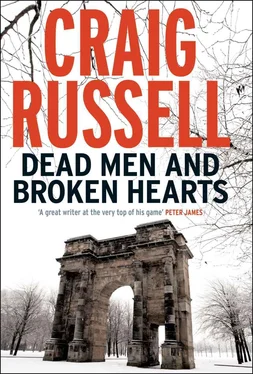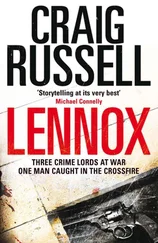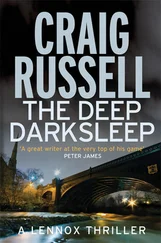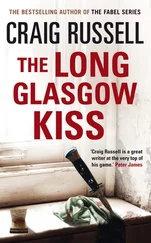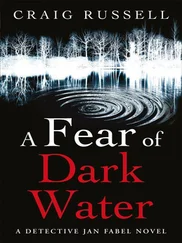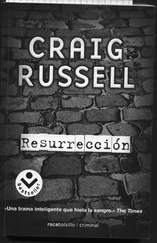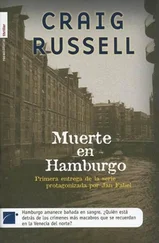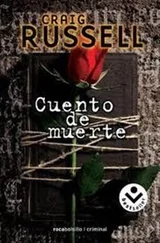Craig Russell - Dead men and broken hearts
Здесь есть возможность читать онлайн «Craig Russell - Dead men and broken hearts» весь текст электронной книги совершенно бесплатно (целиком полную версию без сокращений). В некоторых случаях можно слушать аудио, скачать через торрент в формате fb2 и присутствует краткое содержание. Жанр: Триллер, на английском языке. Описание произведения, (предисловие) а так же отзывы посетителей доступны на портале библиотеки ЛибКат.
- Название:Dead men and broken hearts
- Автор:
- Жанр:
- Год:неизвестен
- ISBN:нет данных
- Рейтинг книги:4 / 5. Голосов: 1
-
Избранное:Добавить в избранное
- Отзывы:
-
Ваша оценка:
- 80
- 1
- 2
- 3
- 4
- 5
Dead men and broken hearts: краткое содержание, описание и аннотация
Предлагаем к чтению аннотацию, описание, краткое содержание или предисловие (зависит от того, что написал сам автор книги «Dead men and broken hearts»). Если вы не нашли необходимую информацию о книге — напишите в комментариях, мы постараемся отыскать её.
Dead men and broken hearts — читать онлайн бесплатно полную книгу (весь текст) целиком
Ниже представлен текст книги, разбитый по страницам. Система сохранения места последней прочитанной страницы, позволяет с удобством читать онлайн бесплатно книгу «Dead men and broken hearts», без необходимости каждый раз заново искать на чём Вы остановились. Поставьте закладку, и сможете в любой момент перейти на страницу, на которой закончили чтение.
Интервал:
Закладка:
‘Well,’ I said, as she counted out my payment in uncreased five-pound notes that looked fresh from the bank, ‘I’m glad that it’s all been sorted out.’
I took the cash. It was exact to the last penny. No bonus. She had been told not to try to pay me extra as any hint of my being bought off would be likely to make me suspicious. I stood up and shook her hand, holding on to it for a second longer.
‘Mrs Ellis,’ I said, ‘are you sure everything is all right?’
‘Of course it is.’ Another smile that was as genuine as the fairy tale she had just spun me. ‘Like I said, I just feel so silly about the whole thing. Getting you involved in this. I should have talked to Andrew first.’
‘Well, as I say, I’m pleased it’s all sorted out, but if you need my help at any time, please don’t hesitate to get in touch.’
She thanked me again and left, trying very hard, but failing, to conceal her relief.
I sat down behind my desk and looked at the neatly counted-out cash. Sometimes there were no answers, I told myself. Or at least no answers that make any sense when you looked at them. And sometimes you just had to walk away from it — none the wiser and none the worse for it.
Whatever had passed between husband and wife, whatever she believed or didn’t believe, whatever story she wanted to concoct for my benefit, it was no longer my business or concern. I’d been paid, and trying to work out what the hell was going on would pay me no more.
Case closed.
Archie came into the office an hour later.
‘Could you do me a favour?’ I asked him before he could hang up his hat. ‘Could you go down to the Glasgow Corporation Planning Office for me?’
‘I’d be delighted.’ Archie said dully. ‘What for?’
‘I’d like you to check out any applications over the last six to nine months that involve site demolition and clearing for a new building.’
‘What? All of them?’
‘No…’ I said, looking at the crisp new fivers sitting on my desk. Next to them, where I had placed it and flattened it out, was the crumpled piece of paper with the company name and address in Garnethill I had used to direct the RAC to my disabled car. ‘Just anything that involves a project called Tanglewood.’
There were no surprises for me over the next couple of days. Archie checked and re-checked, but there was no planning request lodged with the City Corporation for any project named Tanglewood. After making a few calls myself without ringing any bells, I told Archie to forget it; that we were off the case, and we could divide our time on finding the missing Frank Lang. I went from union office to union office, from shipyard to shipyard, doors opening magically for me because I carried the standard of Joe Connelly and the Amalgamated Union of Industrial Trades. Despite Connelly wanting me to be as discreet as possible, he had spread the word far and wide. Everybody was cooperative, but nobody could tell me anything to help.
I traced Lang to his home town, or at least the address the union had for where he had lived before moving to Glasgow. I drove about half an hour south into Lanarkshire and to a small village outside Wishaw.
There was a lot of mining in Scotland. Oil shale. Ironstone. Slate. But most of all, coal.
The business of digging deep into the Earth created strange landscapes. The mining village I drove to was in the middle of nowhere, surrounded by open November-bare countryside painted in a palette of greys and dull greens; mainly farmland with the odd clump of forest. But this was every bit as much an industrial landscape as the docks, shipyards and factories of Glasgow. In the case of Cleland, as with dozens of villages just like it from Ayrshire to Fife, the industry was hidden from view, deep in the earth. The only clues to what was going on under your feet were the mine head towers and gears, and the unnatural black peaks — the spoil tips of mine waste, called bings in Scotland — that flanked the village. And, despite the rural setting, all of the dangers of heavy industry lay as much here as anywhere else, it was just that they lurked hidden from view.
I was no Red, but there were times I could understand why Scotland had become so militantly socialist. People died here all the time, smothered or crushed or drowned in the pit galleries. Even children perished here, falling into disused shafts or through the crust of a burning bing — a spoil tip that had spontaneously combusted deep within — and burning to death. I had heard that in some places, at night, you could see some of the burning bings glow menacingly in the dark, but I was yet to see one for myself.
Scottish mining villages were designed and built as if they were meant to be in urban centres. Ranks of uniform, tiny, single-storey dwellings arranged in tight, ugly rows; exactly the same kind of housing you found in the shadow of factories in towns and cities. The difference with these communities was that the dreary urban architecture would stop suddenly and sharply and you were instantly back into a gentle, rolling rural landscape. It was almost as if someone had cut out a city neighbourhood and dropped it at random into the countryside.
The village was there. The street was there — short, straight, flanked by miners’ houses and declining to a dead end — but when I looked for Lang’s old place, it wasn’t there. The street numbers stopped before they got anywhere close to the one I had for him. I saw an older man heading out of one of the houses further up, close to where I’d parked the Atlantic — the only car in the street. I strolled up and introduced myself and he looked at me as if I had come from another planet. He was small and stooped and had a face of wrinkled grey-white leather, the eyes sunk deep into it. The retired miner had a thick accent and I struggled to understand him, but I picked up that there had never been any houses other than the ones standing. I suspected some kind of administrative error on the part of the union and that the street was right but the number wrong, but the old guy, who had lived in the same house for forty years, assured me there had never been a Frank Lang in that or any nearby rows.
I stood and looked down the narrow, truncated street, across the fields to where, half a mile distant, the stark geometry of the mine head winding gear stood black against the grey sky.
When it came to Frank Lang, the dead ends were becoming more than metaphorical.
Time for a chat.
CHAPTER TEN
As he sat in the corner, a pint glass of flat beer on the table before him, the sound of two miners swearing at each other seeping through from the main bar, Joe Connelly’s fat neck was straining another shirt collar to tolerance. He was wearing the same suit that he’d had on the last time I’d met with him and again it was stretched drum tight over his corpulence. His were not the only beady eyes that watched me as I came into the small room at the back of the working men’s club: Lynch was there too, as I had expected him to be.
‘This is… quaint…’ I said as I sat down opposite them without being asked. I had only ever seen the inside of a working men’s club when I’d been in one on business. My second impression pretty much matched my first. Living conditions for the average Scottish working man must have been dire indeed if he chose to spend his free time in a place like this.
An ugly box of smoke-darkened brick under a shallow-pitched roof, the club was for dock workers, rather than shipyard workers. It sat on the south side of the river, in Govan, at that point where the Clyde swelled into the Queen’s Dock in the north shore and the Prince’s Dock, with its three basins, on the south.
Rather oddly, my instructions had included an order to come around to the back door, where no one could see me. Lynch had been waiting to usher me in unseen by the club’s regulars, who, even at this time of day, were probably too drunk to notice me anyway.
Читать дальшеИнтервал:
Закладка:
Похожие книги на «Dead men and broken hearts»
Представляем Вашему вниманию похожие книги на «Dead men and broken hearts» списком для выбора. Мы отобрали схожую по названию и смыслу литературу в надежде предоставить читателям больше вариантов отыскать новые, интересные, ещё непрочитанные произведения.
Обсуждение, отзывы о книге «Dead men and broken hearts» и просто собственные мнения читателей. Оставьте ваши комментарии, напишите, что Вы думаете о произведении, его смысле или главных героях. Укажите что конкретно понравилось, а что нет, и почему Вы так считаете.
